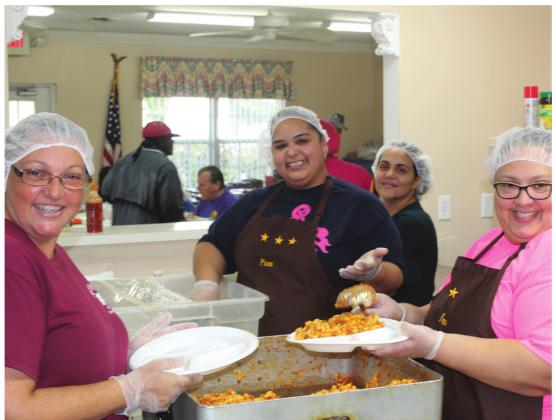People still call it the Daily Bread. It’s the nickname of the Osceola Christian Ministries Center in downtown Kissimmee where upward of 100 men and women – many without a home – eat every day. It’s also where they can see a doctor, get a haircut and take a shower.
An arm of the First Baptist Church of Kissimmee, the center recently turned over operations to the Osceola County Salvation Army at the start of 2020.
The center serves hot meals at lunchtime five days a week. Volunteers from 30 churches provide, prepare and serve the meals. There’s also a food pantry, shower station and a doctor and dentist who provide care at the facility.
The church opened the center in 1993, “but it’s a totally different situation now,” said Alves Gonzalez, Osceola service center director for the Salvation Army.
The need is greater today than it was in 1993, Gonzalez said.
More families are struggling; more people live on the streets.
“The crisis is increasing. Life in Osceola County is very expensive,” he said.
Osceola County’s population nearly tripled between 1993 to 2018, from 123,000 to 368,000.
Not only do several hundred people now live on the streets and in the woods around Osceola, there are some 5,000 people living in motels along U.S. Highway 192, from St. Cloud to Celebration. One thousand of them are children, Gonzalez said.
The Salvation Army, which opened an office in Kissimmee in 2018, has already beefed up services and is planning to expand the former Daily Bread, Gonzalez said.
Along with services for the homeless, the Salvation Army also provides financial assistance with mortgage and rent payments and utility bills.
To qualify for financial assistance, a person must show why they can’t pay the bill and that they will be able to pay the next bill.
“I don’t want people depending on social services. We want to make people selfsufficient,” Gonzalez said.
Some of the restrictions are set by donors, which number 3,000 in Osceola, Gonzalez said. One of the most high-profile supporters is County Commissioner Peggy Choudhry, who has been working to bring a homeless shelter to the county.
Her fellow county commissioners have rejected the idea of opening a homeless shelter. The only permanent emergency shelter in the county is operated by Help Now of Osceola for victims of domestic violence.
Although the Salvation Army does not offer shelter, its expanded services in Osceola are a step in the right direction, Choudhry said.
“It didn’t matter that other elected officials told me no. I know it’s the right thing to do and I’ll keep fighting for the community,” she said.
Choudhry partnered with the Salvation Army after her proposal to build a homeless shelter failed to gain local support.
The next step, she said, is opening the center seven days a week and creating novel programs.
“We don’t want to duplicate anything that’s already being done. We want to partner with other social service agencies that are working with families in need, not just the homeless population,” she said.




